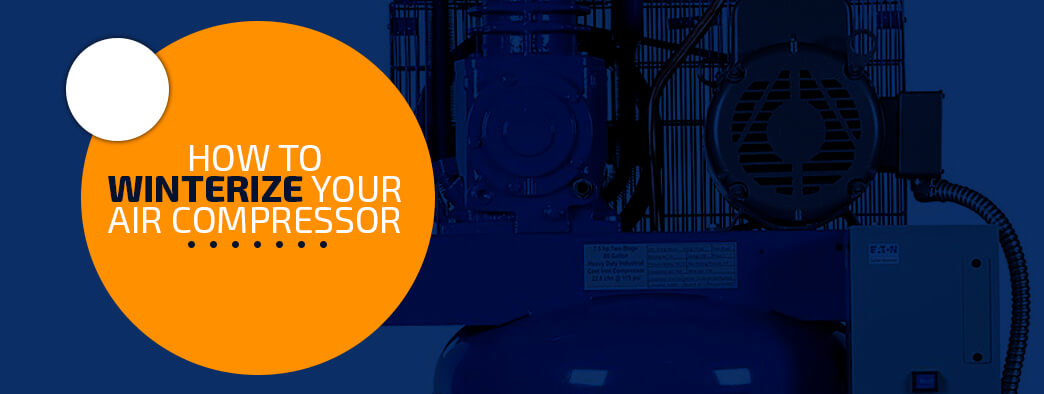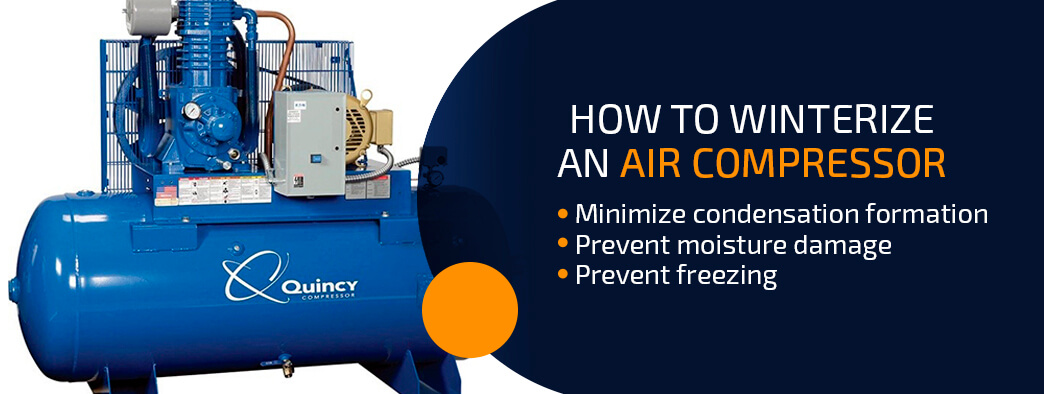November 15, 2019
How to Winterize Your Air Compressor
SHARE THIS POST

Every winter seems to bring more extreme weather, and your air compressor needs to be up to the challenge of the long, harsh winter months. Most standard air compressors are designed for use at an ambient temperature of about 95° Fahrenheit. So the frigid temperatures of winter present a distinct set of challenges for air compressor systems.
Should you winterize your air compressor system? Absolutely. When the winter chills threaten, you can still keep your air compressor system up and running by taking steps to winterize it in advance. Below, we will describe the benefits of winterizing your air compressor and give some tips on how to do this.
Importance of Winterizing Your Air Compressor
Winterizing your air compressor is crucial because the extreme cold of winter will adversely affect the air compressor’s performance. Winter weather and frigid temperatures tend to have the following effects:
- Condensation formation: Condensation formation causes numerous issues inside your air compressor system. It can also lead to ice formation.
- Freezing damage: At below-freezing temperatures, the water inside your air compressor may turn to ice. The formation of ice in the internal workings of your air compressor will impede its function. And because water expands as it freezes, a large volume of ice can also damage the interior of your air compressor.
- Thickened oil: Oil does not usually freeze, but it will thicken at cold temperatures. When oil thickens in frigid temperatures, it loses its lubricating abilities, and the diminished lubrication of your air compressor can damage its components.
How to Winterize an Air Compressor
Knowing how to winterize your compressed air system is essential for peak performance in the winter months. Winterization can help you accomplish the following:

- Minimize condensation formation: During the winter, you’ll need to prevent condensation buildup on your compressed air tanks. If even a small amount of moisture builds up, drain the tank right away. Condensation buildup on your compressed air tanks in the winter can quickly turn into ice. A consistent buildup of moisture can also indicate a problem with the inner workings of your air compressor.
- Prevent moisture damage: One of the main reasons to prevent condensation from forming is to prevent moisture damage. Moisture in your air compressor system causes an array of problems, including rust, corroded paint, corroded instruments, valve damage, supply line clogs and malfunction of controls. The moisture that collects on a compressed air system contains materials like dust, dirt and oils, the buildup of which can cause further damage. In the winter, your equipment is more susceptible to moisture damage because the wintry air holds much less water, so keeping an eye out for signs of moisture damage is essential.
- Prevent freezing: Most of the condensate in your air compressor system is water. If it gets too cold in the winter, even a small amount of water will freeze in the drain lines. Typically, if the ambient outdoor temperature drops below the dew point of the compressed air and the air temperature outside is below freezing, then the water will condense out and freeze.
Tips for Winterizing Your Air Compressor
To winterize your air compressor, follow these tips:
- Check your drains, valves and separators: If your drains are clogged, your air compressor will run less efficiently. In many facilities, air compressors use more energy than any other piece of equipment, so energy savings from increased efficiency can total thousands or even hundreds of thousands of dollars. Clogged drains and water backups can also lead to the formation of ice, and valves and separators are also susceptible to moisture and should be cleaned for winter, especially if your system will be shut down.
- Check your filters: Clogged filters are problematic as well. They can cause drops in pressure and increase the risk of contamination. Clogged filters also provide a place for water and ice to collect.
- Insulate outdoor equipment: One step you can take to prevent moisture in your air compressor from condensing out and freezing is to insulate your outdoor equipment. The outdoor drains and bowls of your air compressor, for example, need special attention during the winter. When the temperature will be below 32° Fahrenheit, it’s a good idea to apply heat trace tape to your drain lines to prevent them from freezing.
- Find and repair air leaks: Air leaks substantially reduce the efficiency of your system. A typical air compressor system whose leaks have not been attended to wastes 20% to 30% of its air capacity and power. And in the wintertime, with its high energy demands, you need your system to be as reliable and efficient as possible. Finding and repairing air leaks before winter sets in helps make sure your system is both air- and watertight.
- Assess your weather strips: Proper insulation is crucial for your air compressor in the winter — it helps keep heat inside so your air compressor maintains optimal performance even in the cold. If any of your weather strips are damaged or missing, be sure to replace them before winter sets in.
- Consider a heat recovery system: In the winter, you need more warm air, and the cost for that air quickly adds up. But a heat recovery system can help. Up to 80% of the electrical energy that goes into a compressor becomes usable heat. A heat recovery system can recover the bulk of the heat given off by your compressed air system and send it back to the compressor, thus preventing the compressor from running at too cold a temperature. You can also duct the heat into other areas, improving your system’s efficiency and giving you valuable energy savings.
- Drain unused lines: If you plan to turn off any of your equipment for the winter — maybe around the holidays — make sure you drain all the water out of the drain lines. Taking this step will help prevent the lines from freezing.
- Adjust your louvers: For the winter, adjust the louvers on your cooling air inlet and compressor outlet. Adjusting the louvers minimizes the amount of contact that your compressor will have with cold, wintry air that could lower its operating temperature, decrease lubrication and allow condensation to form.
- Use ambient heaters or a cabinet: Heaters can help keep your lubricant warm and can protect your system from cold starts, which, as with an automobile, put excessive strain on the motor. In some cases, ongoing wear and tear can lead to system failure.
- Monitor the temperature of your compression room: The freezing of your external equipment is a crucial issue, but it’s also essential not to let your compressor room get too cold. Using space heaters in critical locations is helpful.
- Insulate your compressor room: Even if the interior of your compressor room is warm, the equipment along the external walls may freeze if the room’s insulation is poor. Make sure you have adequate insulation in place to maintain a consistent temperature.
- Contract with a professional service: A professional compressed air team can look over your system and help you get it ready for winter. Getting a second set of eyes on the compressor to make sure you’ve addressed every potential issue is always helpful.
Contact C.H. Reed for All Your Compressed Air Needs
At C.H. Reed, we are proud to offer the best in compressed air services. Our focus on long-lasting, reliable equipment and energy efficiency means our customers require few maintenance repairs and also see substantial energy cost savings.
We offer an extensive catalog of compressed air equipment, and we provide a full range of services as well. When winter rolls around, we can check your system and make sure it’s ready to weather the storms.
Contact us today for a complete system analysis or to learn more.
Search
Categories
Get a consultation
Related Posts
The 3 Distinct Advantages of Hydraulic Powered Pumps
Recently, C. H. Reed helped a major printing operation install a new ink pumping system. The new system needed to transfer four colors of high viscosity, heat-set ink to their three presses, drawing the ink from multiple 5,000…
Simple Ways to Reduce Waste in Your Spray Finishing System
In today’s demanding manufacturing landscape, it can be convenient to adopt a “cut-costs-at-all-costs” mentality, justifying questionable means for the sake of leaner production, a lower bottom line and increased profitability. Regrettably, those efforts can interfere…
What You Need to Know About Air-Powered Pressure Washers
Pressure washers are great solutions for your average cleaning applications, but what tool do you turn to for your more challenging applications? There are many instances where it is simply impossible to use a traditional…
